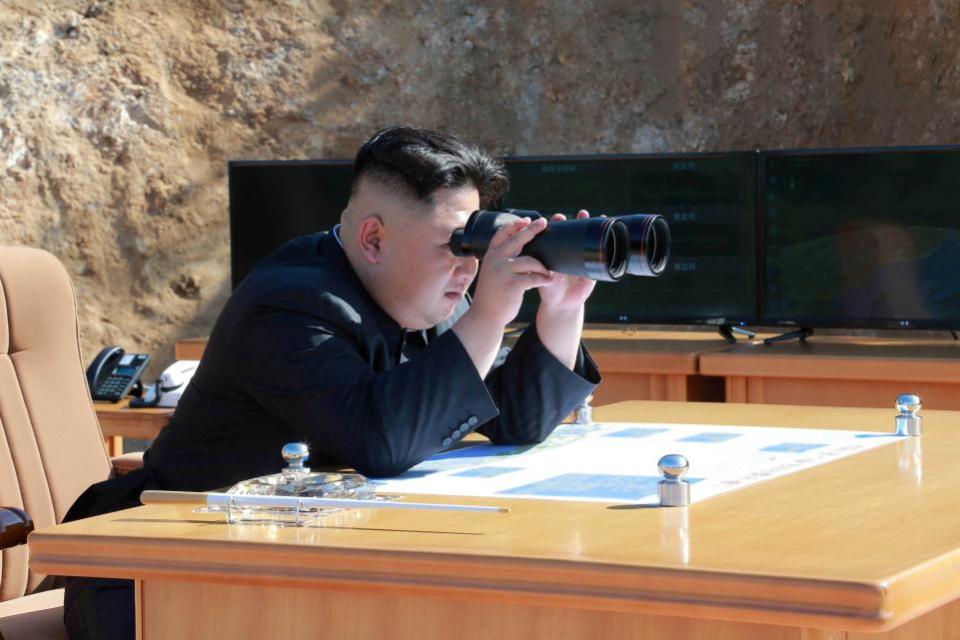U.S. North Korea Policy Must Rely on More Than Threats
In recent days tensions between the U.S. and nuclear-armed North Korea have reached crisis point, with Trump tweeting Friday in response to a North Korean threat to target the Pacific island of Guam that "military solutions" are "fully in place, locked and loaded."
North Korean leader Kim Kong-Un's threat to launch missiles towards the island, where a U.S. military base is located, prompted Trump to threaten “fire and fury” against the rogue state should it attack the U.S.

Experts though say that U.S. attempts to curb North Korea require more than the threat of force.
A nuclear expert who declined to be named told Newsweek that recent history showed that, in deterring a determined state from acquiring nuclear weapons, a degree of cooperation was necessary.
North Korea has developed its nuclear weapons capacity in the face of repeated warnings from the U.S. Among the military options open to Trump is a military strike that would seek to take out North Korea’s program to develop ICBMs and the nuclear warheads they carry.
The source said the U.S. had consistently over-estimated or underestimated North Korea’s nuclear program over the last two decades, and deterrence through force required the capacity to exercise precision strikes on nuclear and other military sites that didn’t result in mass civilian casualties.
However North Korea’s weapons are likely better concealed and dispersed than in in 2010, when the Obama administration warned of a military response to North Korean aggression, or in 1994, when President Bill Clinton considered a strike on North Korea’s nuclear reactor.
William Perry, who served as secretary of defense under Clinton, said a U.S. strike would lead to North Korean retaliation against U.S. allies in the region, resulting in mass casualties.
“We had to assume that North Korea would make a strike on South Korea in some way, and if they were to use their artillery to attack Seoul, they could kill tens of thousands before we could stop them,” Perry told the New York Times. “The price was very high then, but the price today would be very much higher.”
The U.S. military is also concerned that strikes against North Korea would not completely eradicate its arsenal of nuclear weapons, leaving the possibility of a “leaker” or “bleeder’—a missile armed with a nuclear warhead, which could be launched as a revenge attack against the U.S. or its allies.
Writing in the Hill earlier in the week, William D. Hartung, director of the Arms and Security Project at the Center for International Policy, urged a diplomatic solution to the crisis.
“An attack on North Korea could prompt Pyongyang to launch a massive artillery attack on the South Korean capital, Seoul, potentially causing hundreds of thousands of casualties” Hartung wrote. “And even at that great cost, there’s no guarantee that a U.S. strike on North Korea could successfully eliminate its nuclear capabilities.”
He cited diplomatic talks by the Clinton administration, the 1994 framework agreement which stopped Pyongyang’s plutonium production, and the abandoning of diplomatic efforts during George W. Bush's presidency.
He continued: “In short, once we stopped talking and relied solely on sanctions and nuclear threats, North Korea’s nuclear program accelerated. When we talked, and offered economic and strategic incentives, we were able to substantially curb Pyongyang’s pursuit of the bomb.”
World leaders and top diplomats also urged restraint.
Chinese President Xi Jinping asked President Trump not to escalate the situation in a telephone call Friday.
Chinese state news agency Xinhua reported that Xi told Trump he "should avoid remarks and actions that could escalate tensions on the Korean Peninsula. Xi also stressed that China shares common interests with the U.S. in "achieving denuclearization" and maintaining "peace and stability" in the region.
Amid the bluster, there is evidence that the U.S. has not abandoned a diplomatic solution to the crisis, with Associated Press reporting Friday that the administration was quietly engaged in back channel diplomacy with the North Korean government for months.
Related Articles


